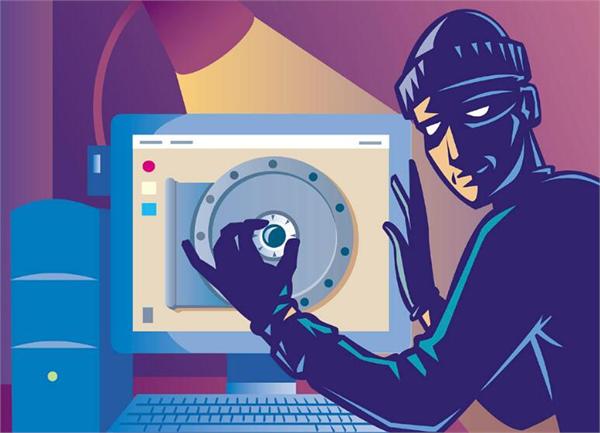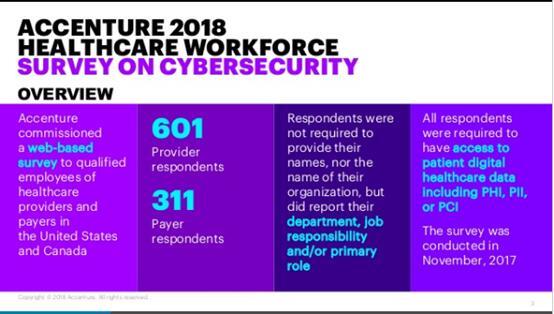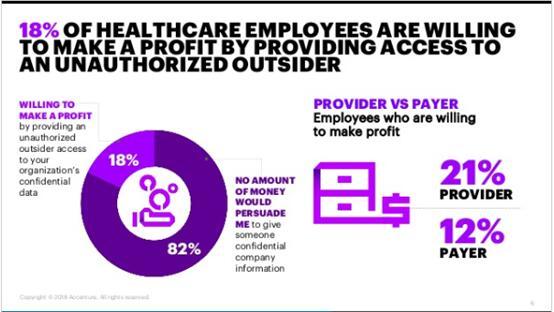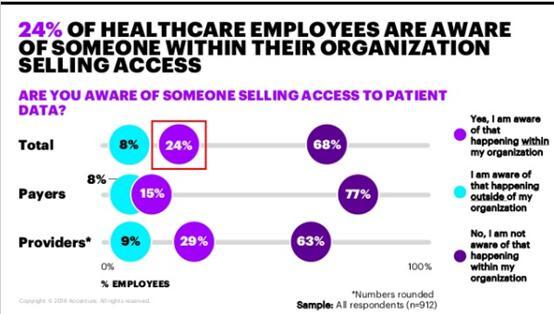
According to a new Accenture survey, nearly one-fifth of the health care staff of (18%) said they are willing to sell confidential data to unauthorized parties.
The survey of 912 employees in US and Canadian suppliers and payment institutions found that 18% of respondents were willing to sell confidential data to unauthorized parties, with a profit of only $500 to $1,000. In addition, respondents in supplier organizations are more likely to sell confidential data (21% vs. 12%) than respondents in payment institutions. This includes operations such as selling login credentials, installing tracking software, and downloading data to a portable drive.


The survey also found that the willingness of healthy employees to sell confidential data is not only hypothetical: about a quarter (24%) of respondents said they know someone in their organization sells their confidential data or contacts unauthorized External staff. These actions have fueled the huge impact of cybercrime, and in 2017, health agencies spent an average of $12.5 million on each user.

“WHO is in the midst of a cyberwar, their own staff is being affected,†said John Schoew, head of Accenture Health and Public Services Security Practices in North America, “for millions of health jobs. For sensitive data, part of the job, organizations must develop a culture of the Internet that addresses these deep-rooted issues and makes employees part of the struggle, not the weak link."
While almost all (99%) of respondents indicated that they are responsible for the security of their data, their actions indicate that organizations can't rely solely on employees to protect data, and 21% say they will enter a record of usernames and passwords. Just beside the computer. Ironically, almost all (97%) of respondents said they understand the organization's interpretation of data security and privacy.
In addition, although 9 out of 10 respondents (88%) indicated that their organization would provide security training, such training is mainly mandatory, the survey results show that training does not play an absolute role. Of those receiving safety training, 17% said they still wrote down their usernames and passwords, and 19% said they were willing to sell confidential data. Surprisingly, the number of people who are regularly trained increases: 24% of employees who receive quarterly training say they write down their usernames and passwords, and 28% say they are willing to sell confidential data. This shows that the quality of the training is important, not the frequency or quantity.
“Employees play a key role in the battle between the healthcare industry and cybercriminals,†Schoew said. “As payment institutions and suppliers invest in digitalization to change productivity, cut costs and improve quality, they need a multi-pronged approach to data security. , including consistent and relevant training, multiple security technologies to protect data and continuously monitor anomalous behavior."
method
To better understand the attitudes and behaviors of healthcare organizations' cybersecurity practices, Accenture surveyed 912 health service providers (601) and payer agencies (311) from the US and Canada. All respondents have access to digital health data, including personally identifiable information, payment card information, and protected health data. The online survey was conducted in November 2017.
Wireless Video Intercom System
Wireless Video Intercom System,Wireless Video Intercom,Wireless Video Door Phone,Wireless Door Intercom System
Zhuhai Mingke Electronics Technology Co., Ltd , https://www.zhmkdz-electronics.com